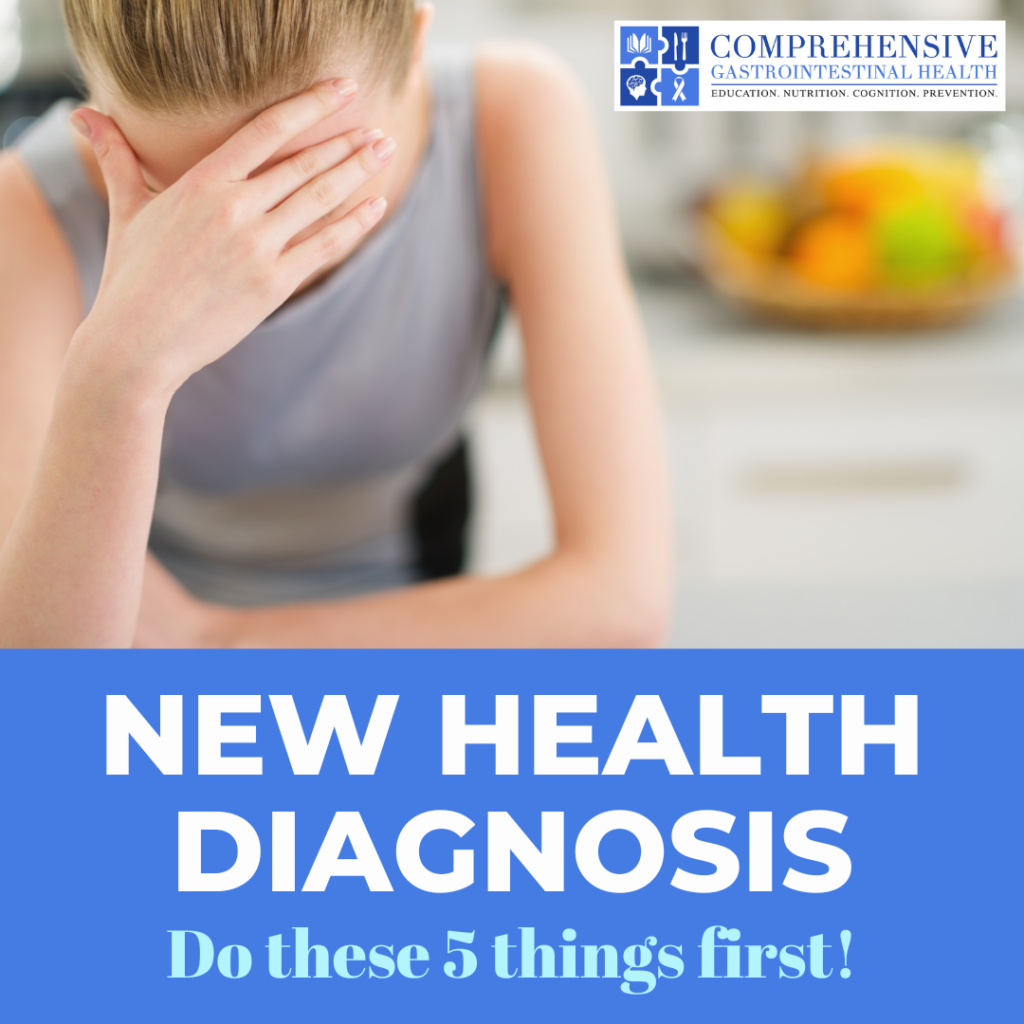YOU HAVE A NEW DIAGNOSIS: DO THESE 5 THINGS FIRST

For many people, receiving a new medical diagnosis can be frightening, confusing and anxiety provoking. There are, however, many things you can do to optimize how you cope with your illness.
1. LEARN, LEARN, LEARN: It is important to learn as much as you can about your diagnosis, treatment options and any medications you have been prescribed. This will also help empower you in conversations with your health care providers and help you advocate for your needs. Keep a separate file on your computer dedicated to your illness, and with helpful information about treatment. Be careful about the “google spiral” – avoid websites that seem unreliable or non-scientifically based. And steer clear of disease specific social media groups – they are often comprised of patients on one end of the spectrum, those who are suffering the most, and tend to increase patient anxiety rather than provide optimism and hopefulness. I recommend the following gastroenterology websites, which are trustworthy and patient friendly.
2. TAKE A DEEP BREATH: A new diagnosis can be very overwhelming. There is often a lot of new information to understand as well as a lot of emotions to process. There may also be medication side effects, dietary and lifestyle changes, more frequent visits to the doctor and unexpected bills. Give yourself plenty of time to adjust to the many changes that a new diagnosis can cause. And while you’re at it, take some very deep breaths, to help ground yourself in the present moment and relax your body.
3. FIND SUPPORT: Did you know that hundreds of studies have found that social support is correlated with better physical and mental health outcomes? Social support is crucial when you have been diagnosed with a new medical condition. Identify three to five people whom you can trust fully and who will be supportive and empathic about your diagnosis. This list can include friends, family, colleagues and coworkers. They may not understand exactly what you are going through but they should be able to lend a listening ear.
4. MAINTAIN YOUR QUALITY OF LIFE: A new diagnosis can certainly cause people to feel like their lives will never be the same. In an effort to avoid feelings of hopelessness and helplessness about your diagnosis, it is important to maintain your pre-diagnosis lifestyle as much as possible. If tennis is your thing, and you’ve just been diagnosed with Crohn’s disease or Irritable Bowel Syndrome, there is no need to end your game. You may be very fearful of having an accident, so make sure to always pack a bag of wipes, a change of clothes, and some hand sanitizer and you can get right back to the court. Game, set and match!
5. SEEK PROFESSIONAL HELP: If you find that you are experiencing increased symptoms of depression or anxiety for several weeks following your diagnosis, it may be helpful to seek professional help. Ideally, the psychologist or therapist will have a strong understanding of your medical condition and have expertise in treating patients with this condition.
If you or someone you know is in need of assistance with a new health diagnosis, please do not hesitate to reach out to schedule an appointment. Call 224.407.4400 or visit www.compgihealth.com to learn more.
For almost two decades, Dr. Jedel was a faculty member at Rush University in the Section of Gastroenterology and Hepatology and worked extensively with patients with a variety of gastrointestinal conditions. She has a deep understanding of the mind-gut connection and the interplay of emotional and mental health with GI symptoms. Dr. Jedel uses an integrative approach toward her work with patients, combining cognitive behavioral therapy techniques to help patients manage their physical and emotional symptoms with insight-oriented therapy to assist patients in achieving a deeper understanding of their feelings and experiences. Utilizing this approach and working collaboratively with patients, Dr. Jedel helps to empower patients to effect change–a transformative process that can enable individuals to endure fewer GI symptoms and enjoy a greater sense of well-being.
Dr. Jedel is seeing patients now at Comprehensive Gastrointestinal Health. She performs both in person and telehealth visits. In addition to helping patients with chronic gastrointestinal conditions, she also welcomes patients who struggle with issues of anxiety and depression independent of any GI symptoms.
